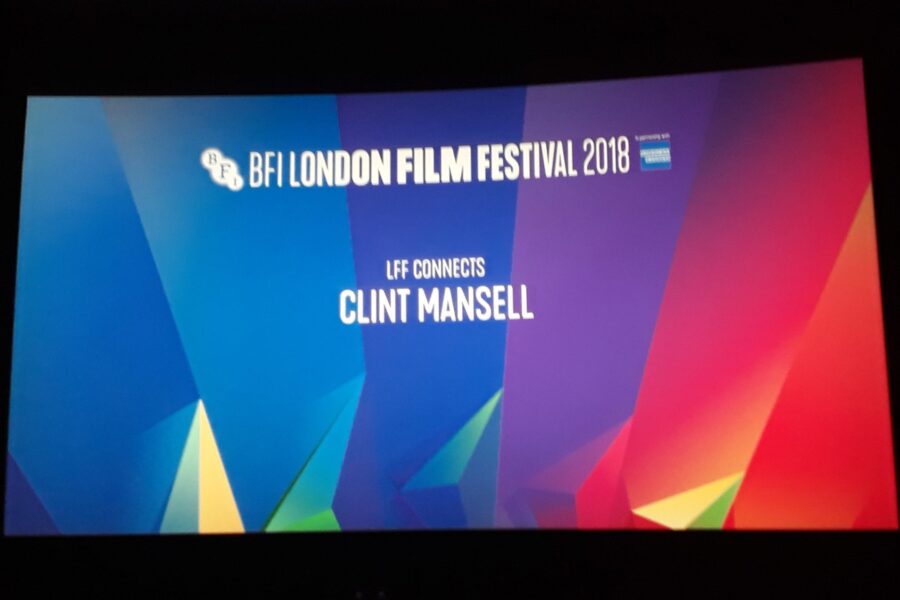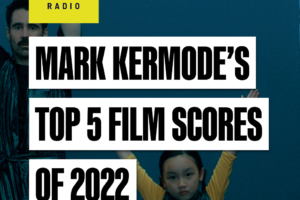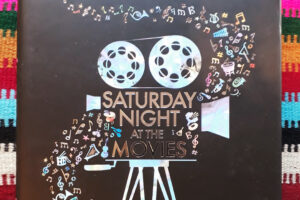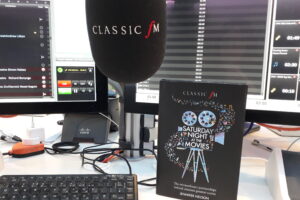How was your October? Did you, like me, spend most of it sitting in a darkened room? I finished my MSc dissertation at the end of September and it was an absolute treat to spend the following four weeks watching films with a press pass around my neck. Lanyards tend to add a touch of authority to proceedings, I find, and enabled me to while away the time in cinemas guilt-free.
As Executive Producer of Saturday Night at the Movies on Classic FM for the last 6 or 7 years, I can no longer watch a film without keeping a keen ear on the music, and here are my three standout musical moments from the 30-odd films I saw at the London Film Festival, in no particular order:
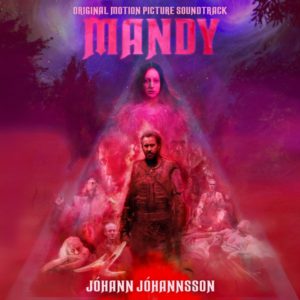
MANDY: I knew what to expect from Johann Johannsson‘s score as I’d been sent a track from it, ‘Children of the New Dawn’, a few months earlier, and had fallen in love with the doom-laden ambience. We tend to avoid playing overtly electronic scores on Saturday Night at the Movies, seeing as the show broadcasts on a classical music station, but made an exception for this, in part because we felt it was important to recognise Johannsson’s final completed score following his death in February.
As with all the best film music, Johannsson’s score sounds great on its own, but only truly works with the accompanying visuals and narrative. This, for me, is one of the best examples in recent months of movie music enhancing the film as a whole. I can’t imagine anything other than these proggy, all-consuming soundscapes complementing the onscreen action as Nicolas Cage wreaks revenge on the cult that killed his girlfriend. Somehow, it sounds as bright red and garish as the visuals.
As for the film, well, a genuine highlight involves Cage, in a T-shirt and pants, wailing in a bathroom. If it’s possible to hand out awards for a single scene, it’s a strong contender – and don’t even get me started on Cheddar Goblin. It’s rare to watch a film for the first time and for it to feel both new and like a familiar, grimy, well-worn B-movie. Mandy is gory, funny, completely bold, and needs to be seen late at night at a cult independent cinema.
HAPPY NEW YEAR, COLIN BURSTEAD: Originally called Colin You Anus, which already makes it a winner in my book, Ben Wheatley‘s latest film is another collaboration with the brilliant Clint Mansell, following on from 2015’s High Rise. I was lucky enough to attend a screening of the film followed by an onstage Q&A with the composer as part of the LFF Connects events.
I really enjoyed the film, and would rate it as one of Wheatley’s finest. It lacks the dread and violence of his some of his earlier projects (tried-and-tested top tip: don’t go and donate blood after watching Kill List), but I loved the quiet menace lurking beneath the mundanity of organising a family get-together on new year’s eve. The cast, including Neil Maskell, Hayley Squires, Doon Mackichan and Joe Cole, is excellent, and the script is full of perfectly pitched throwaway gems and off-the-cuff remarks.
Musically, Mansell plays a blinder, and is proving to be one of the most consistently varied film composers around. He said during the Q&A that he likes pushing himself, so he must have enjoyed rolling up his sleeves to tackle Wheatley’s brief of creating Elizabethan-sounding music. The result is a slightly disjointed, folky score that adds to the underplayed pageantry of the family drama. Mansell, who admitted “I never set out to be a film composer”, praised the musicians for their willingness to experiment and, in his words “to make me look good”.
Clint was disarmingly open during the Q&A as he spoke of his girlfriend’s death and his father’s cancer diagnosis. These events provided clarity for him to get off the “composing rat race” and focus on projects that matter to him. He was clearly touched by Wheatley’s offer, during their first meeting, to delay the production of High Rise so that Clint could be involved when he was in a better place.
It was fascinating hearing Mansell talk about the role that music plays within a film – I liked his description that a score shouldn’t try to do additional heavy lifting and “put a hat on a hat” – but my favourite part of the Q&A was, perhaps unsurprisingly, when he spoke about creative partnerships between directors and composers: “the best thing about a true collaboration is you end up in a place you never expected to get to, and you couldn’t have got there on your own”.
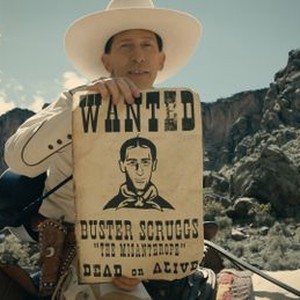 THE BALLAD OF BUSTER SCRUGGS: The Coen Brothers just make it look so easy. Their latest offering serves up intimate stories within the epic landscape of the wild west – I won’t be the first or the last person to advise you to watch this Netflix film on the big screen, if you can, because it’s simply stunning to look at – and their long-standing collaborator Carter Burwell provides the perfect musical accompaniment, as per usual.
THE BALLAD OF BUSTER SCRUGGS: The Coen Brothers just make it look so easy. Their latest offering serves up intimate stories within the epic landscape of the wild west – I won’t be the first or the last person to advise you to watch this Netflix film on the big screen, if you can, because it’s simply stunning to look at – and their long-standing collaborator Carter Burwell provides the perfect musical accompaniment, as per usual.
Admittedly, I’m easy to impress because I think Burwell’s one of the best film composers around today. I love the fact he’s worked with the Coen Brothers since their first feature, Blood Simple, and that Joel and Ethan were quick to praise the composer when Andrew Collins and I met them for a Saturday Night at the Movies interview special to mark the release of Hail, Caesar! According to the Coens, “Carter is never the problem” as “he’s refreshingly not a lunatic”, and they later described him as “a real chameleon, as you have to be if you’re scoring movies” – especially movies as varied as theirs.
The Ballad of Buster Scruggs is a series of curious vignettes, and some have more impact than others. The final story in particular seems to be a hit with the critics, but I was really thrown by ‘Meal Ticket’, in which Liam Neeson, a touring theatre impresario, conveys so much by saying so little. Burwell’s music is woven within the tales, and feels delicately restrained, with moments of hope such as ‘Seeking Alice‘, but I look forward to hearing the full score and properly getting my ears around it when it’s released on November 16th.
